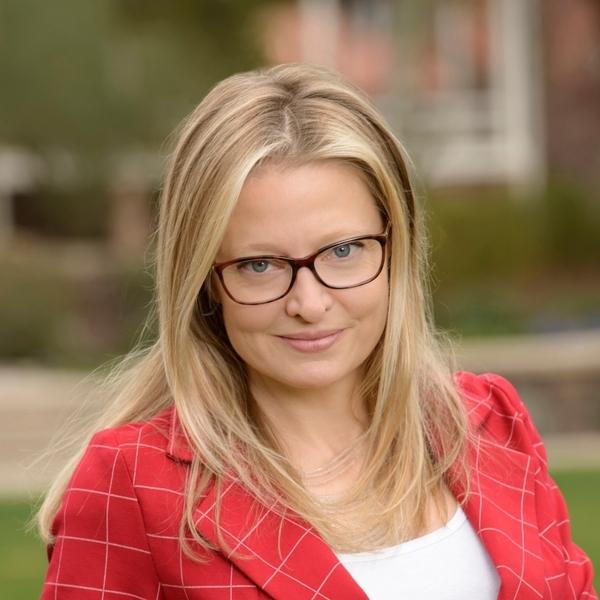MLSC SkyNights Presenter, Director of Smithsonian STARS
Amy C. Oliver is Director of Smithsonian STARS— Scientists Taking Astronomy to Rural Schools— a program of the Center for Astrophysics | Harvard & Smithsonian, Public Affairs Officer and Science Center Manager at CfA’s Fred Lawrence Whipple Observatory, and SkyNights Presenter at University of Arizona’s Mount Lemmon SkyCenter. As an informal science educator and communicator, Amy works to bridge gaps in access to science learning opportunities for emerging and future scientists. She is Principal scientific investigator on Dark SkyNet— a cross-border light pollution monitoring network— and Project GLOWworm, which found unexpected glowworms above 8,000 ft. in Southern Arizona. She holds a BA from University of Louisiana-Lafayette, MS from University of Oklahoma, and DEI certification from University of Wisconsin-Green Bay. Amy was elected a Fellow of the Royal Astronomical Society in 2021 and currently serves as Chair of the Tucson/Pima County Outdoor Lighting Code Committee.
Black N' Blue Hip Hop Crew
Dance performance
BNB Hip Hop Crew is a dance club here at the University of Arizona. We offer a space for students to continue dancing after high school. BNB performs at Bear Down Friday, Basketball games, and hosts open classes for the Tucson dance community once a month.
Singer/songwriter
Singer/songwriter Brian Lopez has been influential in defining the desert noir sound of the American Southwest over the past two decades. The Tucson native, often compared to Elliott Smith and Nick Drake, bridges genres from indie and art rock to Americana, psychedelia, folk, cumbia, and chamber pop. Over his career Lopez has toured with indie bands Calexico and Giant Sand, pop legend KT Tunstall, and the French bossa nova band Nouvelle Vague. His recently released fourth solo album TIDAL exudes the famed desert romantic’s sweet magnetism and characteristic Southwestern pop psychedelic tendencies. A sweeping sense of majesty, which Lopez has called “the exotic beauty that’s exclusive to the Sonoran Desert—desolate, desperate, yet gorgeous,” is woven into the fabric of TIDAL. The result is a lush, dreamlike collection of songs and guitar-driven storytelling that will take you on a sonic journey to the heart of the American Southwest.
Professor of Astronomy
Chris Impey is a University Distinguished Professor of Astronomy at the University of Arizona. He has over 450 publications on education, observational cosmology, galaxies, and quasars, and his research has been supported by $20 million in NASA and NSF grants. He has won eleven teaching awards and has taught four online classes with over 420,000 enrolled and 8 million minutes of video lectures watched. Chris Impey is a past Vice President of the American Astronomical Society, and he has won its career Education Prize. He’s also been NSF Distinguished Teaching Scholar, Carnegie Council’s Arizona Professor of the Year, and a Howard Hughes Medical Institute Professor. He has written 120 popular articles on cosmology, astrobiology and education, two textbooks, a novel called Shadow World, and eleven popular science books.
Associate Professor Aerospace and Mechanical Engineering, Head of SpaceTREx Laboratory
Jekan Thanga has a background in aerospace engineering from the University of Toronto. At MDA Space Missions, he worked on Canadarm, Canadarm 2, and the DARPA Orbital Express missions. Jekan obtained his Ph.D. in space robotics at the UTIAS and did his postdoc at MIT's Field and Space Robotics Laboratory (FSRL). Jekan Thanga is an Associate Professor and heads the Space and Terrestrial Robotic Exploration (SpaceTREx) Laboratory at the University of Arizona. Jekan and his students have co-authored more than 200 technical publications and were winners of the Popular Mechanics Breakthrough Award in 2016 for proposing the SunCube FemtoSat. His team won a Best Paper Presentation Award at AMOS 2019 for the Early Warning Constellation to Detect Incoming Meteor Threats. In 2024, he co-authored a Best Paper on using inflatable rovers to explore lunar and Martian lava tubes at the Earth and Space Conference.
Visual Artist
Jodie Lewers Chertudi is a multi-talented, detail-oriented visual artist with more than 20 years of experience working in graphic design. Growing up in rural Pinal County, much of her art inspiration was found in nature while roaming the desert. She fantasized about big city life and has a huge crush on graffiti art, surrealism, and abstract paintings. Jodie attended Salpointe Catholic High School, played basketball at Pima Community College, and graduated from Northern Arizona University with a degree in Visual Communication. Before starting her own graphic design business in 2010, she served as Art Director at The Nordensson Group, where she oversaw design projects from concept through production. Her expertise spans mural painting to logos, brand development, annual reports, brochures, signage, and digital graphics. Jodie is never happier than when she is bringing an idea to life while rocking out to her eclectic music library.
Associate Professor of Planning
Ladd Keith’s research focuses on heat planning, policy, and governance to help increase the heat resilience of communities, regions, and nations across the world. He is the U of A lead of the Department of Energy-funded Southwest Urban Corridor Integrated Field Laboratory, the co-lead of the National Integrated Heat Health Information System-funded Center for Heat Resilient Communities, the heat research lead of the National Oceanic and Atmospheric Administration funded Climate Assessment for the Southwest, co-investigator of the Centers for Disease Control and Prevention-funded Building Resilience Against Climate Effects, and co-investigator of the National Institutes of Health-funded Southwest Center on Resilience for Climate Change and Health. He also serves on the Management Committee for the Global Heat Health Information Network, a World Health Organization and World Meteorological Organization joint initiative to protect global populations from the health risks of extreme heat.
Assistant Professor Indigenous Resilience
Michael Kotutwa Johnson is an Assistant Professor of Indigenous Resilience at the University of Arizona’s School of Natural Resources and the Environment, Cooperative Extension, and the Indigenous Resilience Center. His research focuses on Indigenous Traditional Ecological Knowledge and Land Use Management schemes related to food, energy, conservation, and water. He is a member of the Hopi Tribe. Most importantly, Dr. Johnson remains a traditional Hopi dryland farming practitioner and continues to give talks on the subject. He has several academic publications and is featured in many stories, podcasts, and social media about his work. He recently started the Fred Aptvi Foundation, focusing on growing traditional Hopi crops, establishing a seed bank, and developing a Hopi youth agriculture program that includes the Hopi language.
Graduate student (PhD) in Department of Geosciences
Sankha Mahanti is a graduate student (PhD) in the Department of Geosciences at the University of Arizona. He is pursuing his PhD in Computational Seismology under supervision of Dr. Eric Kiser in the Global Seismology and Tectonics (GSAT) group. His research primarily focuses on detection of small earthquakes and subsurface imaging in the Andes mountains in South America. Originally, he is from the state of West Bengal in India. Sankha started his PhD journey at the University of Arizona from Fall 2021 after completing his bachelor’s and master’s degree (BS-MS) in Physics from Indian Institute of Science Education and Research (IISER) Kolkata in India (2016-2021).
Library Director, U of A Poetry Center
Sarah Kortemeier oversees the Poetry Center Library, one of North America's premier poetry collections. A working poet, she is a subject specialist in contemporary poetry with additional research interests in library pedagogy, critical cataloging, and library accessibility. Her scholarly writing has appeared in Progressive Librarian and in edited anthologies from the Association of College & Research Libraries and McFarland; her creative work has appeared in The New York Times Magazine, Ploughshares, and others. Her debut volume of poetry, GANBATTE, won the Felix Pollak Prize from the University of Wisconsin Press in 2019.
Founding Director of The Culinary Medicine Program
Dr. Shad Marvasti is the Founding Director of The Culinary Medicine Program and Associate Professor at the UofA College of Medicine Phoenix. He obtained both his MD and MPH from the University of Arizona and completed his medical residency at the Stanford University School of Medicine where he subsequently served as a postdoctoral Research Fellow at the Stanford Prevention Research Center. Dr. Marvasti has served as faculty at Stanford and now at the UofA where he has worked to redesign the 4 year medical school curriculum to include nutrition and the use of food as medicine as well as integrative and lifestyle medicine to prevent and effectively treat chronic diseases. His work in advocating for this new approach has been featured on national media outlets and published in academic journals including the New England Journal of Medicine. Dr. Marvasti is working to develop clinical models that take a whole person approach to empower patients with the tools they need to live healthier.
Director, USA National Phenology Network
Theresa Crimmins is an Associate Professor in the School of Natural Resources and the Environment at the University of Arizona and the Director for the USA National Phenology Network. As a devotee to phenology – the timing of seasonal events in plants and animals – Theresa works enthusiastically to support a broader appreciation for the subject, recognizing the power of simply regularly pausing and looking at the living things in our midst.
Theresa has published over 70 peer-reviewed articles and book chapters. She also frequently writes for non-academic outlets; her writing has appeared in Scientific American, The Hill, The Conversation, and the Arizona Daily Star. Her book, Phenology, a basic primer on the subject, will be available next March through The MIT Press.

